In-Depth Exploration of Mobile Impact Crushers and Their Impact on the Electronics & 3D Printing Industries

The rapidly evolving landscape of electronics manufacturing and 3D printing demands innovative solutions that enhance productivity, improve sustainability, and ensure high-quality output. Among these innovations, mobile impact crushers have emerged as a pivotal technology, transforming the way raw materials and waste are processed in these dynamic sectors. PolygonMach, a leader in crushing technology, specializes in the development and deployment of advanced mobile impact crushers that cater specifically to the complex needs of electronics and additive manufacturing industries. This comprehensive guide delves into the technology, applications, benefits, and future prospects of mobile impact crushers within these cutting-edge sectors.
The Crucial Role of Crushing Technology in Modern Electronics & 3D Printing
As the world moves towards sustainable manufacturing, the importance of efficient recycling and material processing cannot be overstated. In electronics manufacturing, the recycling of electronic waste (e-waste) is critical in recovering valuable metals like gold, copper, and rare earth elements. Simultaneously, the burgeoning 3D printing industry requires high-quality raw materials derived from processed outputs. Both sectors depend heavily on advanced crushing solutions to:
- Reduce material size for ease of handling and subsequent processing
- Reclaim valuable materials from scrap or waste, reducing environmental impact and costs
- Prepare raw materials for additive manufacturing with precise sizing and distribution
- Enhance safety and efficiency by minimizing manual labor and streamlining workflows
Understanding the Mechanics of Mobile Impact Crushers
The core of the mobile impact crusher technology involves a high-speed rotor equipped with blow bars that repeatedly strike and break down raw materials or waste products. Unlike stationary crushers, mobile impact crushers are mounted on chassis, allowing incredible flexibility and mobility on-site. Their innovative design combines crushing, screening, and sorting capabilities into a compact, efficient system.
Key components include:
- Impact Chamber: Where the crushing happens through the action of high-impact forces.
- Rotor Assembly: Houses the blow bars that facilitate material breakage.
- Feed Hopper: Accepts input materials, such as electronic waste or recycled powders.
- Auxiliary Systems: Including dust suppression, conveyors, and sensors.
This dynamic mechanism ensures high throughput rates, precise material sizing, and adaptability to various feedstock types, making it ideal for electronics and 3D printing industries.
Advantages of Mobile Impact Crushers in Electronics & 3D Printing Sectors
The deployment of mobile impact crushers offers numerous benefits that align perfectly with industrial objectives such as sustainability, innovation, and operational excellence:
Enhanced Material Recovery and Recycling Efficiency
In electronics waste recycling, mobile impact crushers enable the rapid processing of mixed scrap materials. They effectively reduce complex waste streams into uniform particles, facilitating further separation and recovery of precious metals. For 3D printing filament production, they prepare recycled plastics by converting scrap into fine powders suitable for additive manufacturing.
Mobility and Flexibility for On-Site Operations
Unlike fixed crushing stations, mobile impact crushers can quickly relocate across manufacturing sites or recycling centers, tackling different feedstocks as needed. This agility significantly reduces logistical costs and minimizes environmental footprint.
High-Quality Product Output for Precise Manufacturing
Precision in particle sizing translates directly into improved quality for raw materials used in 3D printing and electronic components. The impact crushing method ensures uniformity, which is essential for achieving consistent printing layers and electrical properties.
Cost-Effectiveness and Reduced Downtime
Innovative design features such as self-cleaning blow bars, advanced control systems, and durable wear parts decrease maintenance needs and extend service life. This results in lower operational costs and minimal production interruptions.
Applications of mobile impact crushers in the Electronics & 3D Printing Industries
Specific application scenarios demonstrate how this technology drives value:
Recycling E-Waste and Precious Metals Recovery
- Preprocessing of electronic waste: Disassembling and crushing circuit boards, plastics, and metals efficiently.
- Separation of recovered materials: Using subsequent sorting systems to isolate metals from plastics and other components.
- Facilitating closed-loop recycling: Reconstituting pure raw materials for electronics assembly or 3D filament production.
Preparation of Raw Materials for 3D Printing
- Recycling filament scraps: Crushing and grinding used or defective filament into fine powders suitable for re-extrusion.
- Processing plastic waste: Converting post-consumer plastics into high-quality raw material for additive manufacturing.
- Creating composite materials: Mixing processed powders with binders or other materials for specialized 3D prints.
Supporting Sustainable Manufacturing Ecosystems
By integrating mobile impact crushers into waste management and raw material preparation, industries promote a circular economy model, reducing environmental impact and conserving resources.
PolygonMach’s Cutting-Edge Mobile Impact Crusher Solutions
PolygonMach specializes in designing mobile impact crushers that align with the highest industry standards, tailored specifically for the electronics and 3D printing sectors. Their innovative features include:
- Customizable impact chambers to handle diverse material profiles.
- Advanced control panels with real-time monitoring and automation capabilities.
- Robust chassis designs for durability and long-term operation.
- Eco-friendly operation with dust suppression and low emission systems.
Choosing PolygonMach’s impact crushers ensures seamless integration into your manufacturing or recycling workflows, maximizing efficiency and sustainability.
Future Trends and Technological Innovations in Mobile Impact Crushing
The future of mobile impact crushers in electronics and 3D printing is promising, driven by ongoing technological advancements such as:
- Smart sensors and IoT connectivity: Enabling predictive maintenance and process optimization.
- Artificial intelligence: Improving material sorting accuracy and operational adaptability.
- Enhanced energy efficiency: Using hybrid power sources and regenerative systems to minimize energy consumption.
- Modular designs: Allowing quick upgrades and customization for different feedstocks and output specifications.
By staying aligned with these trends, businesses can leverage mobile impact crushers not just as a processing tool but as a strategic advantage in a competitive environment.
Conclusion: Embracing Innovation with Mobile Impact Crushers
In the age of rapid technological progress and sustainable manufacturing, mobile impact crushers stand out as versatile, efficient, and eco-conscious solutions. For industries involved in electronics recycling and 3D printing, they are indispensable in achieving high-quality raw materials, reducing waste, and driving forward the circular economy. PolygonMach remains at the forefront of this revolution, delivering customized crushing solutions that meet the unique demands of each industry segment.
Investing in mobile impact crusher technology not only improves operational efficiency but also aligns with global goals of environmental responsibility and resource conservation. As the electronics and additive manufacturing sectors continue to expand, embracing advanced crushing technology will undoubtedly pave the way for innovative, sustainable, and profitable future strategies.









